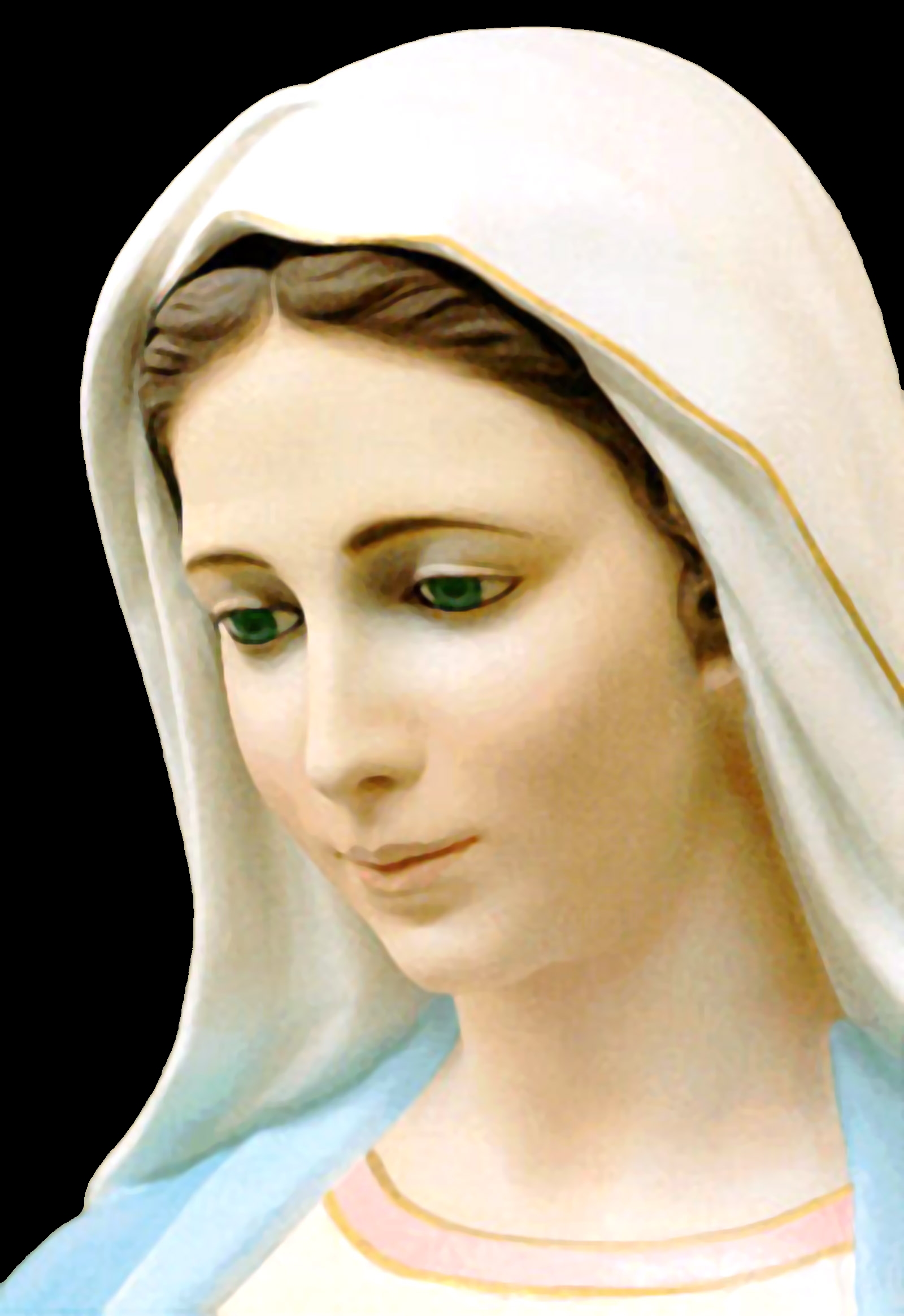
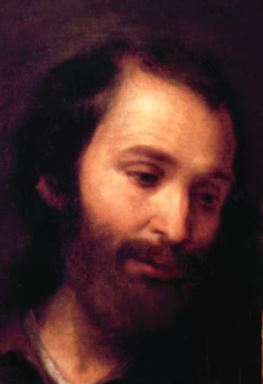
Joseph and Mary | ||
Mary and Joseph(New Era, December 2006) |
The 'New Era' publication is a 'Juvenile' publication, meaning a publication for youth and not
juvenile in a derogatory meaning. As a 'youth' publication, the more simple commonly accepted understanding
of a matter is best suited and Susan Winters has done an excellent job of providing that. With
that said, this review will move to a more scholarly and more critical but not condentionous
level of taking some exceptions to the 'commonly' accepted perceptions given here.
It is 'modern' LDS scholars whose perceptions are 'accepted' here. | |
|
Could Joseph have been a king?
Actually, both Mary and Joseph were of royal lineage. “Had Judah been a free and independent nation, ruled by her rightful sovereign, Joseph the carpenter would have been her crowned king; and his lawful successor to the throne would have been Jesus of Nazareth, the King of the Jews” (James E. Talmage, Jesus the Christ, 3rd ed. [1916], 82).
|
For Joseph to have been King he would have had to have been the 'primary' heir, which Mary was, and
by whom Jesus became heir as her firstborn son.
An exception by the Aramaic Original puts Mary as Matthew's gospel heir. | |
|
What were the names of Joseph’s and Mary’s fathers?
Mary’s ancestors were the same as Joseph’s. She was a descendant through the royal line of King David. “Matthew says Joseph was a son of Jacob, and Luke says that he was a son of Heli. It appears, however, that Jacob and Heli were brothers and that Heli was the father of Joseph and Jacob the father of Mary, making Joseph and Mary first cousins with the same ancestral lines” (Bruce R. McConkie, The Mortal Messiah, 4 vols. [1979–81], 1:316).
|
As Matthew's Royal Genealogy turns out to be Mary's with exception, it is Heli who is Joseph's
father. And Mary's grandfather was Jacob with another named Joseph as Jacob's son who was the
father of Mary.
Joseph and Mary were cousins, but of one generation removed (link above). | |
|
What does it mean that Joseph and Mary were espoused?
“Espousal among the Hebrews was significantly more binding than are our engagements today. It was entered into by written agreement and was considered the formal beginning of the marriage itself. While the couple might not actually live together for as much as a year after the betrothal—a time designed to allow the bride to prepare her dowry—the espousal was as legally binding as the formal marriage” (Gerald N. Lund, in Celebration of Christmas: A Collection of Stories, Poems, Essays, and Traditions by Favorite LDS Authors [1988], 31).
|
This is a good discussion on 'espousal.'
In today's society it ought to be
understood that there were no 'sexual'
relations until after the actual
marriage ceremony itself.
Mary being found with child was not accectable even if it had been child of her espoused Joseph husband to be. | |
|
How old were Mary and Joseph at the time of their marriage?
“No hint of the age of either Mary or Joseph is given in the scriptural text, but from existing sources we can make some educated guesses. … Marriage at earlier ages than to which we are accustomed was the general rule. … For a girl, probably the most common age of marriage was fifteen or sixteen. Sometimes it was later, sometimes earlier, but it is likely that Mary was around sixteen and Joseph, her espoused husband, only two or three years older than that” (Gerald N. Lund, in Celebration of Christmas, 31).
|
Joseph was likely about a half generation older than Mary. Heli was a younger brother of Jacob and
Heli's son Joseph would have been younger than Jacob's son Joseph, but still order than Jacob's son
Josesph's daughter Mary.
- See the line pedigree in Jesus' Genealogy article. | |
|
Why was it necessary for Jesus to have a mortal mother?
“As the Eternal Father’s Only Begotten Son in the flesh, Christ possessed the inborn power to withstand death indefinitely, and this just as naturally as that He, being the offspring of a mortal mother, should derive the ability to die. Jesus Christ inherited through the operation of the natural law of heredity the physical, mental, and spiritual attributes of His parents—the Father immortal and glorified, the mother human. He could not be slain until His hour had come, the hour in which He would voluntarily give up His life, and permit His own decease as an act of will. … Consider for example this: ‘Therefore doth my Father love me, because I lay down my life, that I might take it again. No man taketh it from me, but I lay it down of myself. I have power to lay it down, and I have power to take it again’ (John 10:17–18)” (James E. Talmage, The Vitality of Mormonism [1919], 57).
|
This is a good answer and discussion. Perhaps one concept somewhat borrowed from the Catholic but not really as it is the truth. That is, 'Jesus ought not be considered as being 'half god' and 'half mortal'. He was fully both man and God. He was not just a 'half God' or a 'half man' subject to death. This may work to answer a question as to whether Jesus 'needed to die' or not? And the short answer is 'yes' Jesus needed to die and not just to fulfill the atonement. He as mortal man needed to discard his mortal body by death just as all men do. | |
|
How many brothers and sisters did Jesus have?
In the New Testament, it mentions the brothers and sisters of Jesus. “Is not this the carpenter, the son of Mary, the brother of James, and Joses, and of Juda, and Simon? and are not his sisters here with us?” (Mark 6:3; see also Matthew 13:55–56). “We don’t know how many other children there were in the family, but the New Testament names four boys and lists some sisters. The Greek manuscripts are helpful here. Matthew speaks of ‘all’ (Greek: pantai) his sisters (Matthew 13:56), suggesting more than two. The Greek term hai adelphia (the sisters) is used in the manuscripts, signifying a plurality—that is, three or more sisters. If the record had intended to convey that there were only two sisters, it is probable that the word pantai would not have been employed, but instead the word amphoterai, meaning ‘both,’ would have been used” (Robert J. Matthews, Selected Writings of Robert J. Matthews [1999], 232–33). Jesus could have had at least seven siblings.
|
This is a good complete answer and
discussion for any age. Though Joseph
was a cousin of an older generation,
he was still young enough to father a
full sized family by Mary after Jesus'
birth. That Mary remained a virgin for
her entire life without being fulfilled
by having a full family is sad strict
'Christian Tradition' and not the truth.
It would have been a sin to deprive
either Joseph or Mary of having a full
family of children of 'their' own.
Note: Mary was a divinely inseminated surrogate mother of Jesus. She was a virgin before Jesus' birth and she was still a virgin after and until she joined herself unto Joseph and was known by him, her first man and only man. | |
|
Was Mary widowed?
“The last mention of Joseph is at the Passover in Jerusalem when Jesus was twelve years of age. At the wedding feast at Cana, when Jesus was about thirty, specific mention is made that Mary and Jesus were present, but no mention is made of Joseph (see John 2:1–10). Finally at the time of the Crucifixion, Mary is said to have stood at the cross with other women, but again no mention is made of Joseph. At this time Jesus gave his mother to the care of his beloved disciple, John (see John 19:25–27). The record of these events suggests that Mary was widowed sometime after Jesus was twelve years old and before he began his ministry” (Robert J. Matthews, Selected Writings, 233). “There is a poignancy in the prospect of Mary’s widowhood with a family of children, all younger than Jesus. If this assumption is correct, it may be that Jesus was confronted with the responsibility in early life of providing for a widowed mother and several younger brothers and sisters. This makes most meaningful the scriptural statements that say the Lord is especially mindful of the widow and is a father to the fatherless (see Psalm 68:5; 146:9; James 1:27)” (Robert J. Matthews, Selected Writings, 233–34).
|
Deduced variously, of course Mary was a widow by the time of Jesus' death. Joseph was her senior by 15 or so years. The exact cause of death is unknown and perhaps insignificant if of natural causes. Joseph's absence at the marriage feast is telling, but up to 30 years of marriage is fully adequate time to father a family. Joseph could have been of an age of 60 or so if he married at about 35. And still Mary certainly was well widowed when placed by Jesus into the care of John the apostle at Jesus' death. Whether that was due to John being most trusted or because John was there and Jesus' brothers were not for fear of their own lives is not known. | |
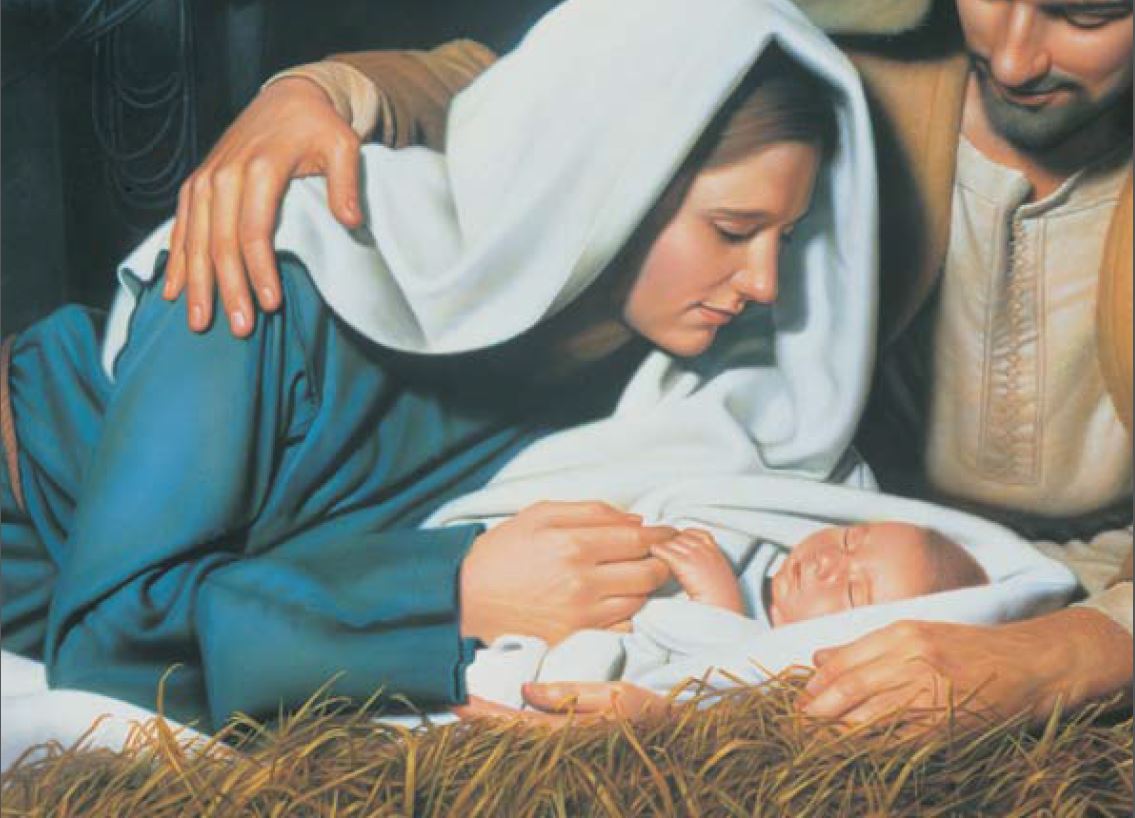 The Savior needed a loving family here on earth. Mary and Joseph provided that family. (His Name Shall Be Called Wonderful © Simon Dewey, may not be copied; Shepherd at Nativity © Robert Barrett; My Son, My Savior © Simon Dewey.)
The Savior needed a loving family here on earth. Mary and Joseph provided that family. (His Name Shall Be Called Wonderful © Simon Dewey, may not be copied; Shepherd at Nativity © Robert Barrett; My Son, My Savior © Simon Dewey.)
|
Both Joseph and Mary were loving parents of Jesus and they provided him with brothers and sisters to complete the 'family' experience. | |
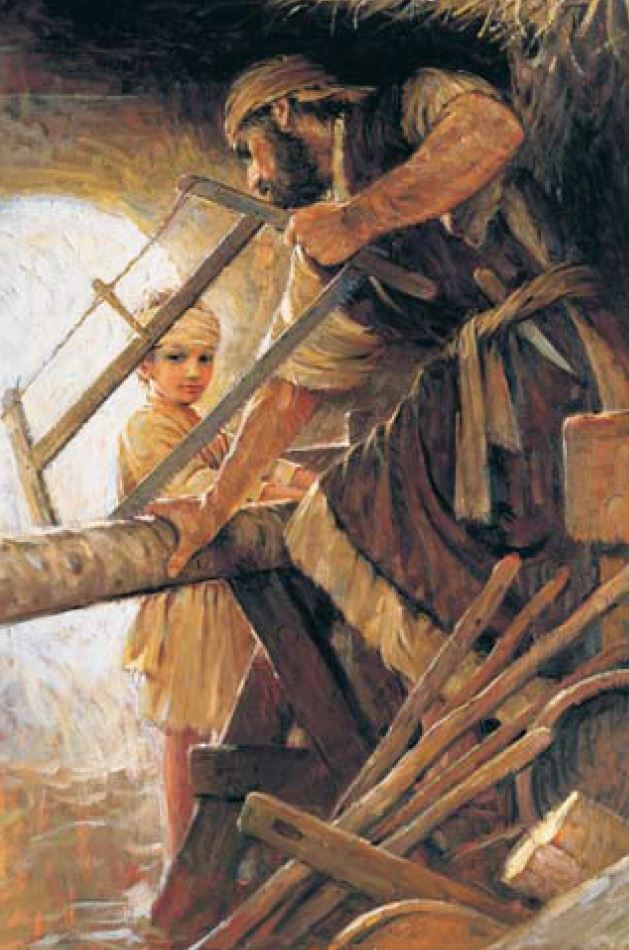
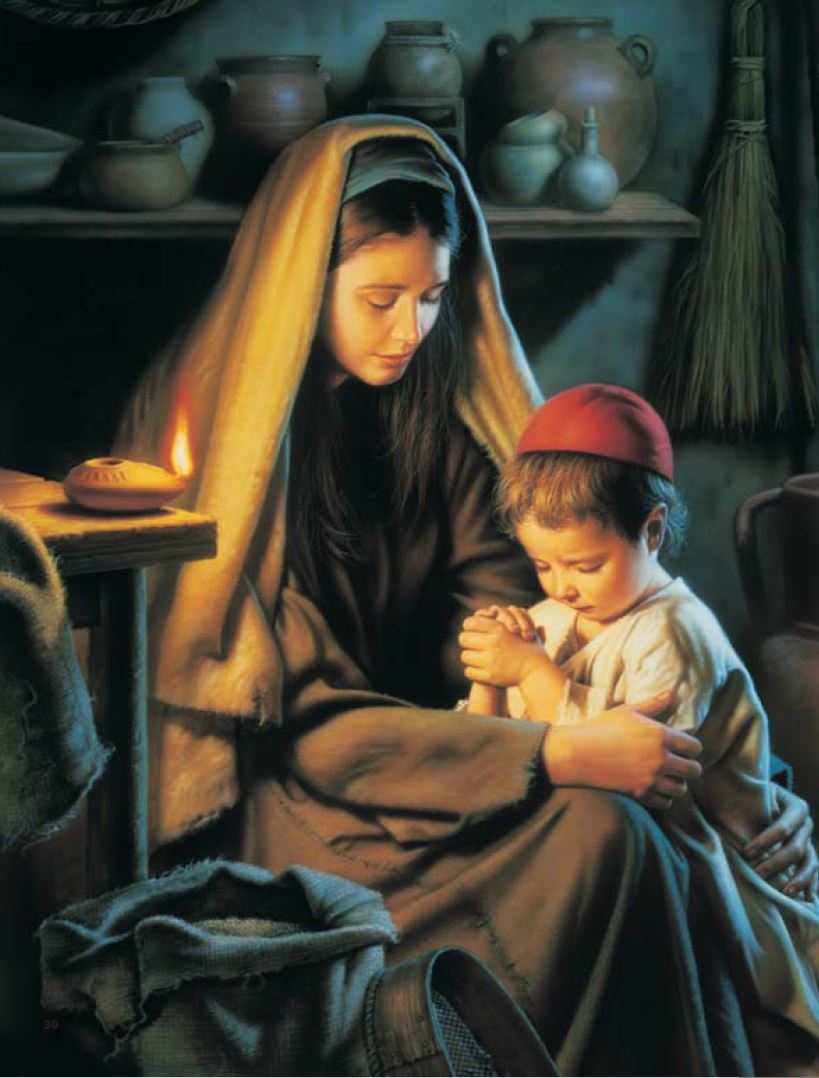 The Christ child learned about his Heavenly Father at his mother’s knee. Joseph loved the child and
was his protector.(In Favor with God©Simon Dewey, may not be copied; And the Child Grew and Waxed
Strong in Spirit©Walter Rane, courtesy of Museum Church History & Art; photography
Christina Smith.)
The Christ child learned about his Heavenly Father at his mother’s knee. Joseph loved the child and
was his protector.(In Favor with God©Simon Dewey, may not be copied; And the Child Grew and Waxed
Strong in Spirit©Walter Rane, courtesy of Museum Church History & Art; photography
Christina Smith.)
|
Jesus learned from both his mother and father. He also learned by study, inherently, by the spirit, and even likely visitations. By age 12 he knew who he was. He may not have known all, but he knew he was the Son of God. | |
|
[illustrations] Though Mary was the only earthly parent of Jesus, Joseph was regarded as his
father and Jesus treated him as such, being “subject unto” him (see Bible Dictionary,
“Joseph,” 71).
|
Mary was the biological parent, but Joseph was 'his eartly father' as much as any are. Jesus respected them both. | |
rev. 24 December 2015